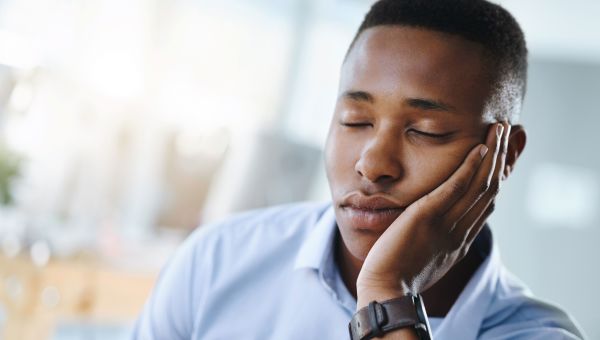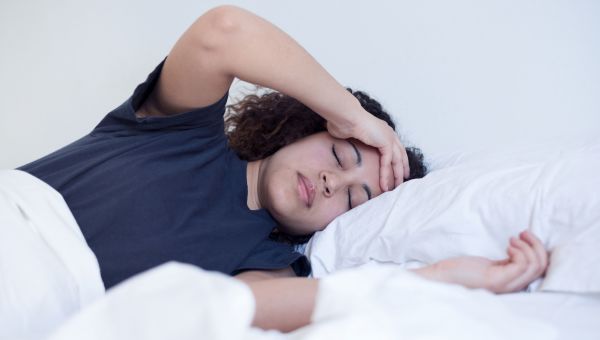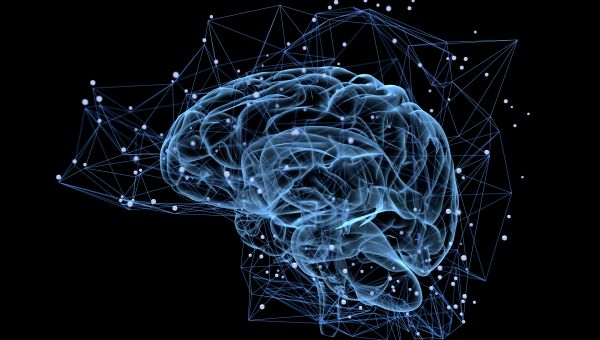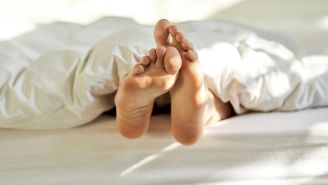Do you know the signs of sleep deprivation?
Muddled thinking, poor reflexes (don’t get behind the wheel!), memory problems—and that’s the short list.

Are you sleep deprived? According to the Centers for Disease Control and Prevention (CDC), about one in three Americans is. “Sleep deprivation is a broad term to describe someone not getting an adequate amount of sleep,” explains Brian Mieczkowski, DO, a pulmonary and sleep medicine physician at the Research Medical Center in Kansas City, Missouri. “The amount… Show More
Are you sleep deprived? According to the Centers for Disease Control and Prevention (CDC), about one in three Americans is. “Sleep deprivation is a broad term to describe someone not getting an adequate amount of sleep,” explains Brian Mieczkowski, DO, a pulmonary and sleep medicine physician at the Research Medical Center in Kansas City, Missouri. “The amount of sleep you need changes with age. Naturally infants and preschoolers need more than adults. But people age 18 to 60 should get at least seven hours of sleep nightly.”
How do you know if you’re actually sleep deprived? One basic sign is how you feel the next morning—like you’re just not firing on all cylinders, a feeling that can last all day. While grogginess may not seem like that big of a health concern, behind the scenes, sleep deprivation is having a serious effect. “Sleep is an active process,” says Mieczkowski. “It’s not a lack of [being] awake.”

Reasons for sleep deprivation
So, what’s keeping us up? For starters, those with a sleep deficiency don’t appreciate how much sleep they really need. According to Mieczkowski, people tend to skip sleep because of work and family commitments, distractions (getting caught up on social media can quickly eat into your sleep time), … Show More
So, what’s keeping us up? For starters, those with a sleep deficiency don’t appreciate how much sleep they really need. According to Mieczkowski, people tend to skip sleep because of work and family commitments, distractions (getting caught up on social media can quickly eat into your sleep time), not keeping a regular bedtime and then trying to catch up on sleep on weekends. Furthermore, “we try to accommodate for the trouble caused by sleep deprivation with caffeine and energy drinks that keep you awake, despite your body saying that you need to sleep,” he says.
Acute sleep deprivation is defined as no sleep, or curtailed sleep, for one or two nights. “But more often, people don’t get an adequate number of hours night by night,” says Mieczkowski. “They have low-levels of chronic sleep deprivation, perhaps only getting five hours each night, due to busyness or insomnia, which is the inability to fall—or stay—asleep.” Click through to discover what happens to your mind and body when you're short on sleep.
Show Less
Cognitive difficulties
“We know from many studies that in people with sleep deprivation, reaction time dramatically decreases,” Mieczkowski explains. “Our ability to be aware of our surroundings also decreases.” These impairments can, for example, affect our ability to drive safely. Our executive functioning also slows… Show More
“We know from many studies that in people with sleep deprivation, reaction time dramatically decreases,” Mieczkowski explains. “Our ability to be aware of our surroundings also decreases.” These impairments can, for example, affect our ability to drive safely. Our executive functioning also slows down: We might have trouble making decisions, forming long-term memories, thinking creatively and solving problems.
Show Less
Weakened immune system
Sleep deprivation can also affect your immune system. Some research suggests that your flu shot may not be as effective because your body isn’t able to build up as strong as an immune response.
You may also be susceptible to catching colds. In one study lasting 14 days, 153 healthy men and women… Show More
Sleep deprivation can also affect your immune system. Some research suggests that your flu shot may not be as effective because your body isn’t able to build up as strong as an immune response.
You may also be susceptible to catching colds. In one study lasting 14 days, 153 healthy men and women age 21 to 55 reported how much time they’d slept the night before and whether they felt rested. Average sleep scores were calculated. The study participants were then quarantined and given nasal drops containing a rhinovirus that causes common colds. The researchers found that those who slept less than seven hours were nearly three times more likely to develop a cold than those who slept eight hours or more.
Show Less
Out-of-sync biological clock
Our circadian rhythm (the body’s 24-hour biological clock), which is affected by light and dark, also regulates sleep. Disruptions in the circadian rhythm can make it more difficult to pay attention.
Napping won't help if you find yourself nodding off. "You can’t recoup lost sleep during the day… Show More
Our circadian rhythm (the body’s 24-hour biological clock), which is affected by light and dark, also regulates sleep. Disruptions in the circadian rhythm can make it more difficult to pay attention.
Napping won't help if you find yourself nodding off. "You can’t recoup lost sleep during the day time,” Mieczkowski says. “Trying to do so leads to more fragmented sleep at night. There are separate drivers for when you’re supposed to wake and sleep.”
Show Less
Disrupted sleep patterns
According to Mieczkowski, our bodies attempt to capture sleep regardless of whether we cooperate. For example, the brain tries to protect certain types of sleep—in particular the deeper, restorative stages. You may know this as REM or dreaming sleep. “This type of sleep helps with memory… Show More
According to Mieczkowski, our bodies attempt to capture sleep regardless of whether we cooperate. For example, the brain tries to protect certain types of sleep—in particular the deeper, restorative stages. You may know this as REM or dreaming sleep. “This type of sleep helps with memory consolidation and [relieves] feelings of sleepiness,” he says. “The trouble with having shortened periods of sleep is that we don’t really get into deeper stages right off the bat, so that’s where the brain changes.”
If you go long enough with low-levels of sleep deprivation, the brain actually starts trying to increase slow wave and REM stages earlier and earlier in the night to try to recapture them. It throws off the brain’s natural pattern of sleep. “After a while, the brain will try to ‘drive’ you to sleep and your level of fatigue will continue to increase [until you do sleep],” he explains.
Show Less
Preventing sleep deprivation
Appreciate the importance of sleep and keep a regular schedule. In general, the body only accommodates to shifts in bedtimes of about half an hour. “The most important time of the day for your sleep/wake cycle is your wake-up time,” Mieczkowski says. “Keeping a consistent wake time during the week… Show More
Appreciate the importance of sleep and keep a regular schedule. In general, the body only accommodates to shifts in bedtimes of about half an hour. “The most important time of the day for your sleep/wake cycle is your wake-up time,” Mieczkowski says. “Keeping a consistent wake time during the week and on weekends allows your body to get into a set pattern so it knows when to sleep and when to wake up.”
Show Less
When should you see a sleep specialist?
Mieczkowski advises that if you have significant concerns about your sleep that have lasted a month or more, or struggle to stay awake and depend on coffee just to make it through the day, talk to your primary care doctor or a sleep specialist.
And if someone you sleep with tells you that you snore… Show More
Mieczkowski advises that if you have significant concerns about your sleep that have lasted a month or more, or struggle to stay awake and depend on coffee just to make it through the day, talk to your primary care doctor or a sleep specialist.
And if someone you sleep with tells you that you snore or have unusual breathing patterns (for example, gasping or big sighs), you may have sleep apnea. This is a common condition that can cause sleep deprivation and other health problems; it's important to share these symptoms with your healthcare provider.
Show LessMore On


video

article

slideshow


video


video
